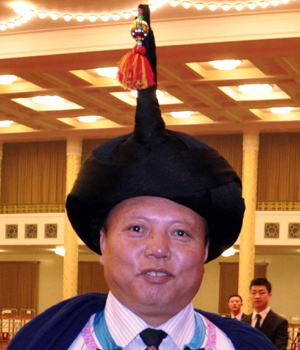Wang Jichao's first language is Yi, but when he was 13 a teacher taught him to say a few words in Mandarin, including Beijing and Tian'anmen. He struggled to pronounce them, and had no idea what they meant.
 |
|
Wang Jichao [Photo/CHINA DAILY] |
On Monday, as a National People's Congress deputy representing Guizhou province, he arrived in Beijing for the two sessions at the Great Hall of the People on Tian'anmen Square.
Wang, a member of the Yi ethnic group, was born and raised in a remote mountain village in the province.
"In order to study science and other subjects, we had to learn Mandarin," said Wang, 58, who is now the director of a Yi language translation and research center at Bijie in Guizhou.
"Now the situation has changed: We need to preserve our ethnic language, as it is disappearing."
Wang said the number of people who speak Yi has declined sharply.
"In a county with 100,000 people, less than 1 percent speak Yi, let alone read and write the language," he said.
"Language is the spirit of our culture. It carries the history of our group. To preserve our ethnic culture, we have to save our language first."
Since 1982, Wang has been involved in researching and translating ancient texts written in the Yi language. He has published more than 30 books and translated Yi literature, including epic poetry, history and documents, into Chinese.
The texts were carved on rocks, bamboo sticks and bones, or written on leather, clothes and paper. Many have rotted and become blurred.
"If nobody saves them, then a language that is thousands of years old will eventually die," Wang said.
"The young generation feels it doesn't have to learn the Yi language to find a job and communicate. Mandarin is very easy to learn, because it is everywhere. Children learn Mandarin in cartoons and textbooks, but where can they learn the Yi language? Nowhere."
Yi characters, like those used in Mandarin, are square. Wang read out a poem, and though the pronunciation seemed strange, the rhymes were familiar-they are in fact similar to those used in ancient Chinese literature.
Wang said the poem was a prayer sent by the ancient Yi people to the god of knowledge.
"The Yi people admired literature. They worshipped the god of poetry and the god of books on special days," he said.
Wang has suggested to the NPC that elementary schools in areas where people of the Yi ethnic group live should provide Yi language classes.
Contact the writer at pengyining@chinadaily.com.cn
Su Jiangyuan and Zhao Kai contributed to this story.
Related Stories